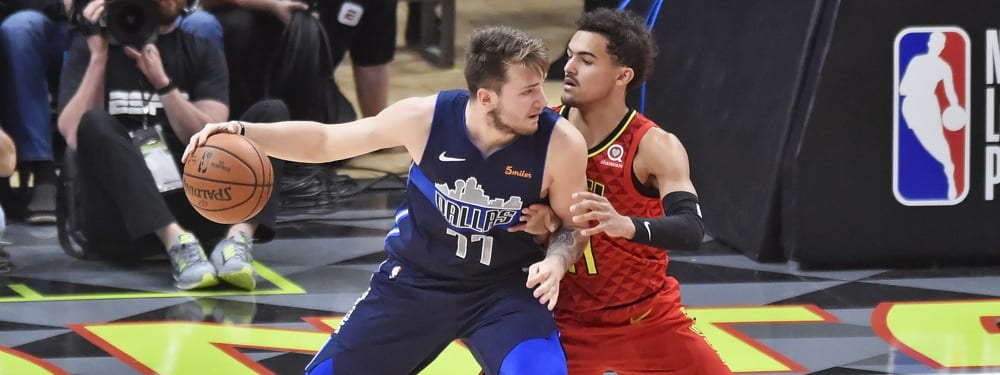Recent RotoWire Articles Featuring Ryan Anderson
See More
Anderson opened the 2017-18 season as the team's starting power forward. Over the first 57 games, he averaged 10.0 points, 5.3 rebounds and 2.1 three-pointers across 27.6 minutes. However, after dealing with both ankle and hip injuries during the second half of the season, Anderson was ultimately fazed out of the rotation and he averaged just 12.4 minutes in the final 20 games that he suited up for (including the playoffs). For his career, Anderson has averaged 2.1 three-pointers at a 38.2 percent clip, which would seem to fit into the Rockets' style of play. However, it's his hefty contract that's prompted the Rockets to search for trade partners once again this offseason. Anderson is set to make $20.4 million during the upcoming campaign, which is an excessive amount for what will likely be a complementary role player. If Anderson isn't traded and does return to Houston, he'll stick to his typical routine and provide a floor-stretching big man. Newly added Carmelo Anthony, as well as P.J. Tucker would likely be his main competition for minutes, which suggests Anderson could at least carve out a rotation role. That said, considering his lack of court time to end the 2017-18 campaign, as well as his potential to be traded prior to the season, Fantasy owners may want to take a cautious approach when evaluating Anderson.
Following four seasons with the Pelicans, Anderson inked a four-year, $80 million contract with Houston in hopes of bringing a floor-spacing power forward who could hit the three in a fast paced offense. While Anderson didn't necessarily make as big of an impact as expected, he did start all 72 games he played in and was very solid from deep. He knocked down 2.8 three-pointers per game, while shooting 40.3 percent from beyond the arc, his second best finish across his nine-year career. Adding on to that, Anderson posted averages of 13.6 points and 4.6 rebounds across 29.6 minutes. It was a disappointing drop from the 17.0 points he averaged in his final season with the Pelicans, although not entirely surprising considering the upgrade in talent around him. Still, the Rockets were clearly regretting the hefty contract they give Anderson, as they tirelessly looked for a trade partner to get rid of Anderson's cap hit this offseason. Nothing ended up coming to fruition though and Anderson is back with the Rockets once again. Chris Paul was added to the roster in a trade, providing yet another elite passer and playmaker. That means Anderson is going to continue to get plenty of wide-open looks and if he shoots over 40 percent from deep again, he should be able to match or surpass his scoring average from a season ago. However, Anderson still struggled to add much as a rebounder with Clint Capela and Nene Hilario dominating the glass and he's non-existent in terms of assists, steals and blocks, which limits him to a scoring and three-point specialist in most Fantasy formats.
Injuries plagued Anderson during his four years in New Orleans, but he now steps into a system tailored to his strengths as one of the NBA’s top volume three-point shooters at the power forward spot. With James Harden leading new coach Mike D’Antoni’s pace-and-space offense, the Rockets will score in bunches, and Anderson will have the green light whenever he’s on the floor. The 28-year-old projects to start after mostly serving in a bench role last year, bringing elite floor spacing to complement the defensive stylings of Clint Capela. In theory, Capela’s rim protection will help to offset Anderson’s shaky-at-best defensive reputation, while Anderson’s shooting will open up penetration lanes for the ball-dominant Harden. Anderson has averaged at least two made three-pointers per game in each of the last six seasons -- he also ranks 10th in the NBA with 833 made treys over that span -- a trend that should have no problem continuing under D’Antoni. If the minutes are there -- and they should be -- Anderson will have an excellent chance to improve upon his 2015-16 scoring (17.0 per game) and rebounding (6.0) averages, though he doesn’t provide much in terms of assists, steals or blocked shots.
Anderson suffered through by far his worst season as a Pelican last year, slogging through 61 games while averaging 28 minutes, 13.7 points, 4.8 rebounds, and 0.3 blocks per game. The minutes, points, and rebounds were all the lowest they've been for Anderson since 2010-11—before he burst onto the scene with the Orlando Magic. The trait that has made Anderson a fantasy darling in the past, his three-point shooting, also suffered mightily last year. The career 38-percent shooter watched his percentage plummet to 34 last year, making just 122 triples. A weak rebounder and shot blocker with newfound concerns about his shooting, Anderson will need to impress new coach Alvin Gentry to wrestle away playing time from Omer Asik and Alexis Ajinca—both of whom were re-signed to pricey contracts this offseason. When on the court, Anderson should benefit from Gentry's affinity for three-point shooting. However, the forward has played just 83 games over his past two seasons and has topped 66 games just once in his career. Anthony Davis' defensive prowess will help mask Anderson's deficiencies in that department if the eighth-year man out of California experiences a shooting renaissance.
Anderson enters the 2014-15 season with more questions than answers. The big man's sixth NBA season ended with a serious neck injury that ultimately required surgery. This June, coach Monty Williams said he expects Anderson to be ready for training camp this fall, but the level of his play is still a question mark given the severity of the injury. Anderson was in the midst of a strong season before succumbing to injury. In 22 games, Anderson averaged 19.8 points, 6.5 rebounds, 0.5 steals, and 0.3 blocks to go with 41 percent shooting from beyond the arc in 36 minutes of action. Anderson isn't the best rebounding power forward in the league, and his 0.3 blocks per game leave something to be desired, but his excellent shooting from both three-point range and the free-throw line, where he shot 95 percent last season, make him a productive fantasy player. Anderson will almost certainly come off the bench behind Anthony Davis and Omer Asik this season, but that won't be a detriment to his minutes, as he still logged more than 30 per game in 2012-13 despite coming off the bench in 59 of his 81 games. Assuming he's healthy, he should have no problem carving out a big role in the New Orleans offense.
Anderson built on his breakout season in 2011-12 with another strong campaign in 2012-13, establishing himself as one of the best three-point shooters in the league. The stretch forward averaged 16.2 points (42 percent from the field, 84 percent from the line), 6.4 rebounds and 2.6 three-pointers made per game despite playing on a new team and in a new system. Despite not providing fantasy teams with the typical big man stats such as rebounds, blocks and field goal percentage, Anderson's three-point shooting ability made him relevant in all fantasy formats. He missed just six games over the past two seasons, further adding to his fantasy value heading into the 2013-14 season. Anderson might start alongside sophomore sensation Anthony Davis in at the frontcourt, giving him all the room to operate beyond the three-point arc. His rebounding numbers are not likely to improve, as Anderson plays further from the basket. However, with new additions in Jrue Holiday and Tyreke Evans taking on some of the defensive pressure, Anderson may see even more opportunities from downtown. Anderson will head into this coming season at the age of 25, hopefully with more confidence than ever.
Anderson won the NBA’s Most Improved Player award in 2011-12 while averaging 16.1 points and 7.7 rebounds and shooting 39.3 percent for Orlando. The award sounds nice, but sometimes being most improved means a player just got a chance to play more minutes. And that’s what happened for Anderson, who averaged 10 more minutes per game. He made the most of the extra playing time and earned himself a four-year deal with the rebuilding Hornets. It may be hard for Anderson to replicate his production in 2012-13. One hurdle is that there were more shooters to defend on Orlando’s roster last season than will line up with him in New Orleans. Playing off Dwight Howard is not the same as playing off Robin Lopez. Anderson, who has a reputation of playing away from the basket, was a surprising fifth in the league in offensive rebounding last season. We’re expecting a drop in his rebounding production this year. He’s supposed to see most of his time at small forward and power forward but could also see some minutes at center. How opponents defend Anderson and scheme against the team will change. He’ll draw more attention. He’s got value as a long-distance shooter--the Hornets ranked 23rd in three-point shooting and 29th in offense--so someone like Anderson is needed in New Orleans. After Eric Gordon, Anderson should get the second most shots on this team.
Anderson is an ideal fit for Stan Van Gundy’s perimeter-shooting friendly offense. He provides the luxury of spreading the floor with his three-point shooting (39 percent last season). Even though he’s not a defensive presence at 6-10, his rebounding improved last year, despite playing next to Howard. As long as Howard is drawing double teams, Anderson will be a lethal 3-point shooter and should easily average double digits.
Rashard Lewis is not the only 6-10 player on the Magic’s roster who prefers to play away from the basket. Anderson’s size indicates ‘power forward,’ but he plays more like a guard. He hit 78 three-pointers last season and shot an efficient 86.6 percent from the free throw line. Those numbers alone give him some fantasy value, and the chance to see more tick when Lewis moves to the wing makes him a nice upside pick late in your draft.
Anderson was a throw-in to the Carter deal, but he's not your typical trade filler. Anderson, who will be entering just his second season, has a nice shooting touch for a big man and has already started 30 games in his career. He probably won't see the playing time with the Magic that he did with the Nets last season, but he could help the club replace some of the production lost with the departure of Hedo Turkoglu.











